|
|
|
Sort Order |
|
|
|
Items / Page
|
|
|
|
|
|
|
| Srl | Item |
| 1 |
ID:
121864
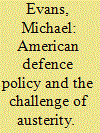

|
|
|
|
|
| Publication |
2013.
|
| Summary/Abstract |
This article examines the Obama administration's attempt to rebalance U.S. strategy towards the Asia-Pacific region with special emphasis on Southeast Asia. It argues that America's regional pivot is occurring at a time of unprecedented domestic fiscal austerity caused by a staggering level of national debt. The U.S. domestic budget crisis, the current "declinist" debate, concern over the rise of China, and the impact of sequestration on American defence spending are analysed and their implications for Southeast Asia are assessed. The article suggests that the most serious aspect of the U.S. debt crisis may be its impact upon American strategic resilience and geopolitical confidence. Thus, while many ASEAN nations have welcomed the U.S. strategic pivot as a valuable reinforcement of their security, they remain unsure that it is a sustainable policy. In the future, it is likely that reassuring ASEAN of the longevity of the U.S. commitment to the Asia-Pacific will require of Washington a skilled blend of budgetary reform, military presence, and sustained diplomatic effort.
|
|
|
|
|
|
|
|
|
|
|
|
|
|
|
|
| 2 |
ID:
127619
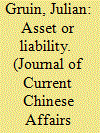

|
|
|
|
|
| Publication |
2013.
|
| Summary/Abstract |
China's financial system, dominated by the banking sector, has played a central role in the development of an imbalanced trajectory of economic development and growth. As one of the primary mechanisms for implementing decisive macro-economic policy, the banking sector has hitherto served the Chinese growth strategy well in actively allocating capital towards the investment and export sectors, whilst proving capable of managing the macro-economic ramifications of this highly inter-ventionist strategy. However, the role of the financial system in this growth strategy is also rooted in the requirement that authority over financial capital remains closely tied to state institutions and policies, due to elite concern over politico-economic instability. Based on policy analysis and qualitative interviews conducted in mid-2012, the article suggests that whilst the structure of the financial system was conducive to fostering the growth of the real economy, it will hold back not the need for rebalancing, but rather the process of rebalancing itself.
|
|
|
|
|
|
|
|
|
|
|
|
|
|
|
|
| 3 |
ID:
142635
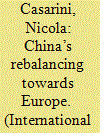

|
|
|
|
|
| Summary/Abstract |
Chinese leaders tend to think strategically about Europe. By following the process of European integration closely in the last decades, they have succeeded in identifying at different historical junctures those European integration initiatives that would serve China’s national security and foreign policy objectives. EU policymakers, instead, appear unable to think strategically about China as EU member states tend to focus on bilateral relations with Beijing, thus undermining Brussels’ capacity to fashion a clear and coherent China policy. There is thus a glaring disparity between Beijing and Brussels when it comes to strategic thinking. With China’s economic and political rebalancing towards Europe underway, there has never been more need for an adequate response from the Union.
|
|
|
|
|
|
|
|
|
|
|
|
|
|
|
|
| 4 |
ID:
117733


|
|
|
|
|
| Publication |
2012.
|
| Summary/Abstract |
Australia's profile as one of Washington's leading allies in the Asia Pacific has grown due to the Obama Administration's rebalancing strategy. While New Zealand is both unable and unwilling to match the intensity of its neighbour's relationship with the world's leading power, its own strategic ties with Washington have strengthened considerably in recent times. While Australia's alliance with the United States may raise future challenges vis-Ã -vis its increasingly important relationship with a rising China, New Zealand also has a balancing act to maintain, not least because of its close economic ties with the People's Republic. In different ways both Australia and New Zealand may currently be reducing their room for maneouver if and when the contest between the United States and China becomes more severe. The risks may be higher for Australia because the same strategic geography that gives it renewed prominence may also increase its exposure to competition and conflict in Asia, and because its own military rebalancing towards the north and west of the continent is occurring just as its defence budget has been significantly cut. For New Zealand, while those direct risks may be smaller, staying on Canberra's radar screen will become harder. Indeed as they each look towards their own relationships with the major powers, Australia and New Zealand may need to work even harder to sustain their own bilateral alliance relationship.
|
|
|
|
|
|
|
|
|
|
|
|
|
|
|
|
| 5 |
ID:
152507
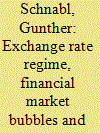

|
|
|
|
|
| Summary/Abstract |
Since 2014, capital inflows into China have turned into capital outflows, reversing the gradual appreciation path of the renminbi against the US dollar into an erratic depreciation path. The paper explains the current capital outflows by comparing China and Japan with respect to the impact of exchange rate expectations on speculative capital flows. It is argued that both in China and Japan, given benign liquidity conditions in the USA, policy-induced appreciation expectations have generated capital inflows that have contributed to overinvestment and financial market bubbles. The current reversal of capital flows is seen as a signal that the bubble in China has burst. To stabilize growth in China and to discourage speculative capital outflows a fixed exchange rate to the dollar is recommended. Given Japan's experience and given that China's foreign assets remain high, the depreciation pressure on the Chinese renminbi can be expected to abate.
|
|
|
|
|
|
|
|
|
|
|
|
|
|
|
|
| 6 |
ID:
087603
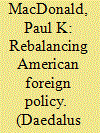

|
|
|
|
|
| Publication |
2009.
|
| Summary/Abstract |
The United States faces unprecedented
foreign policy and national security
challenges.1 Conflicts in Iraq and Afghanistan,
the global war on terrorism,
the proliferation of nuclear weapons,
the increasing assertiveness of Russia,
the growth of Chinese military power,
global climate change, not to mention
the spread of poverty, infectious diseases,
and ethnic and religious strife
around the world: the challenges aren't
limited; the resources to meet them are.
The high operational tempo of the wars
in Iraq and Afghanistan has stretched
the military to the breaking point. The
ongoing ½nancial crisis and economic
recession will severely limit the ability
of the federal government to sustain
or increase expenditures for defense
and foreign aid.
|
|
|
|
|
|
|
|
|
|
|
|
|
|
|
|
| 7 |
ID:
111484
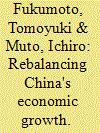

|
|
|
|
|
| Publication |
2012.
|
| Summary/Abstract |
One of the greatest challenges China faces is reshaping its heavily investment-driven mode of economic growth. By investigating how the rebalancing of Japan's economic growth mode was realized in the 1970s, we indicate that it is essential in rebalancing to correct the distortions in factor cost (labor cost and capital cost) in a harmonious way. In addition, we refer to Japan's experience to indicate that rebalancing of domestic growth does not necessarily lead to external rebalancing.
|
|
|
|
|
|
|
|
|
|
|
|
|
|
|
|
| 8 |
ID:
127603


|
|
|
|
|
| Publication |
2013.
|
| Summary/Abstract |
This article provides an analysis of policy initiatives aimed at rebalancing China's political economy, especially those contained in the 12th Five Year Plan and other recent pronouncements. The objective is to generate a conceptual examination of these policy measures, thereby highlighting their basic intent and purpose. The analysis shows that the Chinese leadership intends to pursue policies that can centralize, standardize and regulate the political economy under continued state guidance. Due to the considerable political obstacles that Chinese policy-makers face in rebalancing the political economy, a more state-centric approach is seen as necessary. China is therefore pursuing a policy package of refurbishing state capitalism. While a degree of liberalization is likely to be undertaken, the major thrust is one of revamping, restructuring and, ultimately, strengthening state control and guidance over the political economy.
|
|
|
|
|
|
|
|
|
|
|
|
|
|
|
|
| 9 |
ID:
119106
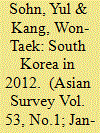

|
|
|
|
|
| Publication |
2013.
|
| Summary/Abstract |
An election year in South Korea witnessed a rise in deep discontent and distrust with the current political system that failed to address a growing demand for rebalancing in both domestic and foreign policies. Conservative successes led by Park Geun-hye in two elections demonstrate that South Korean voters do not support the opposition's promise for radical reform. But the most significant message of the 2012 elections was that existing party politics could not be sustained without some fundamental political reforms, expressed by the "Ahn syndrome" yearning for new politics.
|
|
|
|
|
|
|
|
|
|
|
|
|
|
|
|
| 10 |
ID:
137897
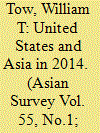

|
|
|
|
|
| Summary/Abstract |
Visible U.S. efforts to sustain influence in the Asia-Pacific met with mixed success. President Barack Obama’s visit to the region reinforced alliance commitments, but U.S. policy momentum on regional trade and diplomacy remained sluggish. Washington’s effective management of its relations with Beijing remains the key factor to how well the U.S. will fare with other regional actors and issues.
|
|
|
|
|
|
|
|
|
|
|
|
|
|
|
|
| 11 |
ID:
142634


|
|
|
|
|
| Summary/Abstract |
The US policy of ‘rebalancing to Asia’ is likely to have major implications for transatlantic relations as well as for the role of rising powers, such as China. US public opinion and leaders are largely aware of this eastward shift in attention and this awareness can be considered, albeit in a somewhat indirect way, an indicator of support for the policy. On the other side of the Atlantic, however, Europeans seem to be less aware of the fact that the Far East is becoming the main chessboard of international relations in a multipolar global order. Nevertheless, when objectively informed about China, people on both sides of the Atlantic are less in favour of a shift in interests toward Asia and their negative perceptions of China are significantly correlated to a hesitancy in supporting a rebalancing policy. Moreover, if people perceive Beijing as a threat, especially an economic threat, they are even less likely to support a shift of interests to the Far East, the only exception being American elites, who tend to increase their support for the rebalancing strategy in the presence of a Chinese economic threat.
|
|
|
|
|
|
|
|
|
|
|
|
|
|
|
|
|
|
|
|
|